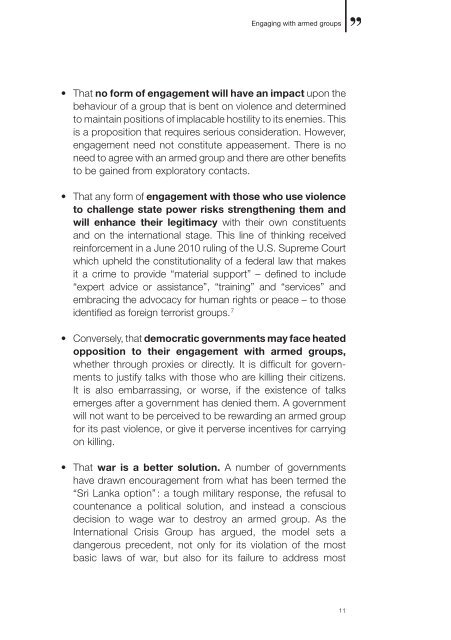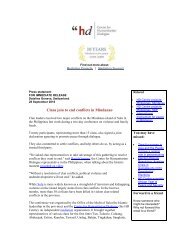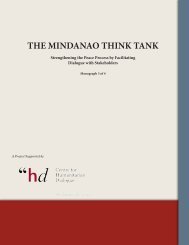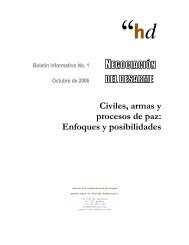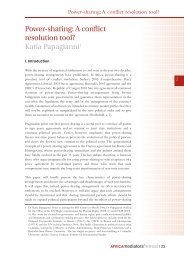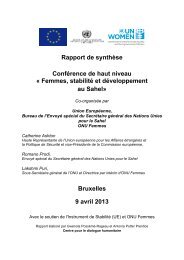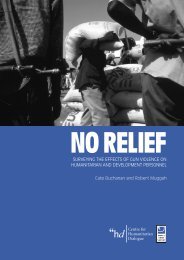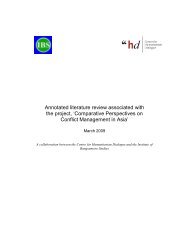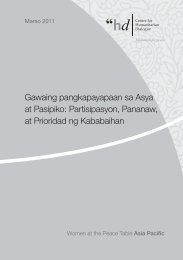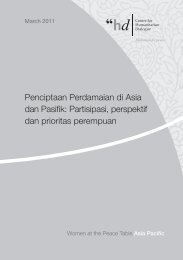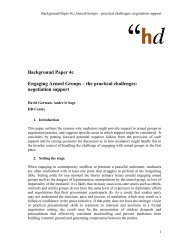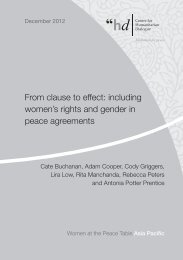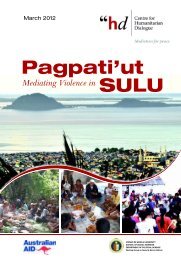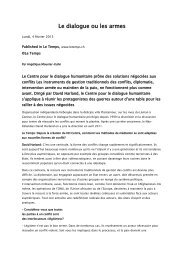Engaging with armed groups - Centre for Humanitarian Dialogue
Engaging with armed groups - Centre for Humanitarian Dialogue
Engaging with armed groups - Centre for Humanitarian Dialogue
- No tags were found...
Create successful ePaper yourself
Turn your PDF publications into a flip-book with our unique Google optimized e-Paper software.
<strong>Engaging</strong> <strong>with</strong> <strong>armed</strong> <strong>groups</strong>• That no <strong>for</strong>m of engagement will have an impact upon thebehaviour of a group that is bent on violence and determinedto maintain positions of implacable hostility to its enemies. Thisis a proposition that requires serious consideration. However,engagement need not constitute appeasement. There is noneed to agree <strong>with</strong> an <strong>armed</strong> group and there are other benefitsto be gained from exploratory contacts.• That any <strong>for</strong>m of engagement <strong>with</strong> those who use violenceto challenge state power risks strengthening them andwill enhance their legitimacy <strong>with</strong> their own constituentsand on the international stage. This line of thinking receivedrein<strong>for</strong>cement in a June 2010 ruling of the U.S. Supreme Courtwhich upheld the constitutionality of a federal law that makesit a crime to provide “material support” – defined to include“expert advice or assistance”, “training” and “services” andembracing the advocacy <strong>for</strong> human rights or peace – to thoseidentified as <strong>for</strong>eign terrorist <strong>groups</strong>. 7• Conversely, that democratic governments may face heatedopposition to their engagement <strong>with</strong> <strong>armed</strong> <strong>groups</strong>,whether through proxies or directly. It is difficult <strong>for</strong> governmentsto justify talks <strong>with</strong> those who are killing their citizens.It is also embarrassing, or worse, if the existence of talksemerges after a government has denied them. A governmentwill not want to be perceived to be rewarding an <strong>armed</strong> group<strong>for</strong> its past violence, or give it perverse incentives <strong>for</strong> carryingon killing.• That war is a better solution. A number of governmentshave drawn encouragement from what has been termed the“Sri Lanka option” : a tough military response, the refusal tocountenance a political solution, and instead a consciousdecision to wage war to destroy an <strong>armed</strong> group. As theInternational Crisis Group has argued, the model sets adangerous precedent, not only <strong>for</strong> its violation of the mostbasic laws of war, but also <strong>for</strong> its failure to address most11


